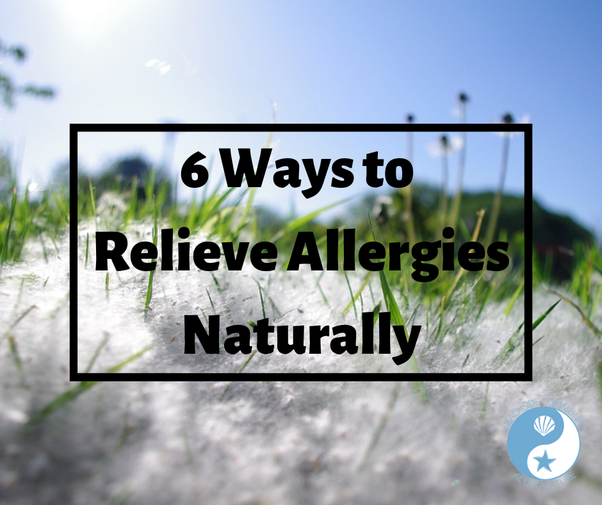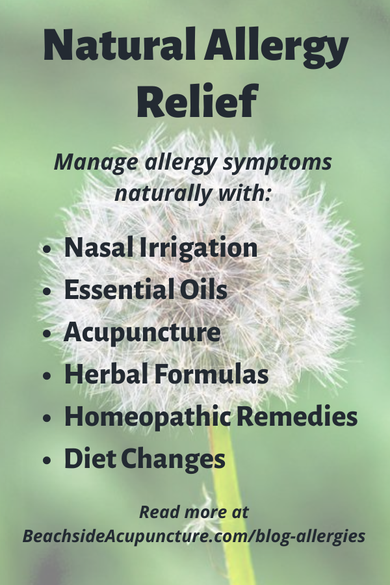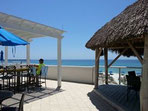
This post contains affiliate links, meaning Beachside Community Acupuncture PLLC may receive a small commission for purchases made through certain links at no additional cost to you. (In other words, you support us in a small way when you buy the products that we highly recommend and would use ourselves!) Click here to view our full disclosure policy.
Allergies can be very frustrating, and while over-the-counter medicines and prescription medications can provide relief, many people either do not want to take them for fear of side effects or still need additional support. Luckily there are a variety of natural remedies that may help alleviate allergy symptoms. We recommend trying each individually to see how you respond, and then developing a routine that combines the remedies that give you the most relief.
Nasal Irrigation
We encourage reading our full blog post on the topic of nasal irrigation, but basically it's the act of flushing irritants out of your nose with something like a neti pot. Some of our patients make this a daily practice during allergy season, while others only use their neti pots after they've gone outside or been exposed to an allergen. Nasal irrigation can also loosen and remove some mucus, but it's not a good idea to try it if you are very stuffy as the congestion will block the flow of the saline water.
Essential Oils
Essential oil users will know that "LLP" stands for Lavender, Lemon, and Peppermint, the combination of which can be very helpful for allergy relief. Peppermint on its own can do wonders for energy and sinus relief - try rubbing a drop between your palms and then cupping them over your nose - and many companies also make essential oils blends specifically for immune regulation and/or respiratory health.
To utilize LLP, either keep the three bottles separate and drop from each of them, or make your own blend by mixing them in a separate bottle. Pure essential oils can be used aromatically, topically, or internally, and LLP is no different. Diffuse the blend of oils or inhale it directly, apply it to your feet as a form of reflexology, or drop it into a beverage or capsule. Keep in mind that even essential oils that are labeled "100% Pure" can have adulterants in them, so it's best to follow the uses indicated on their bottles. (Or just stick with a company that you can trust.)
Acupuncture (And Acupressure)
Of course, we have to mention acupuncture... Traditional Chinese Medicine (TCM) has its own way of diagnosing and treating allergies, and we have plenty of patients who come to us with allergies as their chief complaint. Acupressure can also be used for allergy symptoms like headaches and phlegm and for supporting the Lung system in general. You'll find specific acupoints mentioned throughout our blogs here, but if you have symptoms and aren't sure which points to massage for them, you can also search Google or simply ask us at your next appointment.
Allergies that don't respond to traditional acupuncture treatments may warrant Namburipad's Allergy Elimination Technique (NAET), which combines elements of TCM and homeopathy. We do not offer NAET at our clinic, but you can use this directory to find a practitioner near you.
Herbs
Herbs for allergies abound in almost every system of medicine. TCM has a formula called Yu Ping Feng San that is wonderful for building up and/or regulating the immune system and variations of it also clear out congestion. (We recommend buying herbs from a Licensed Acupuncturist rather than buying them online because they are more likely to be of a good quality.)
In naturopathy, herbs like stinging nettle may help symptoms, and many naturopathic formulas will also containing antioxidants like quercetin, which is also known for its allergy benefits.
Homeopathic Remedies
Often confused with naturopathy, homeopathy is a system of medicine that originated in Germany and involves taking remedies in the form of sugar pills or solutions. Much like TCM, homeopathy relies on the examination of detailed symptoms to assess the best treatment for a patient, and there are a host of homeopathic remedies that can be used for allergies based on specific symptomology. Histaminum hydrochloricum is one that can be very useful for hay fever and hives, but you can also look through the Boiron a "store" on Amazon for other remedies that might be a better fit for you.
Homeopathic remedies can also be found in gels, creams, and other forms. For allergies that irritate the eyes, Similasan eye drops contain remedies that can be applied directly to the eyes themselves.
Diet Changes
In TCM choosing foods that are white in color or pungent in taste can alleviate allergies as they support the Lung system. We also say cold foods and dairy can promote more dampness and phlegm in the body, so avoiding them would be best if your symptoms include congestion and mucus.
From a more naturopathic perspective, limiting foods that produce inflammation in the body can help - common inflammatory foods include sugar and dairy - and including foods that are high in quercetin and other phytonutrients may be beneficial as well.

These are a few of our favorite ways to control allergies naturally, but there may be others out there that are an even better fit for you. As with any health concern, play detective: See how each remedy works for you and keep experimenting until you discover what your body needs. Allergies may come and go with age, changing homes, and other stimuli, and learning to be in tune with your body's changes can be a lifelong process.

Kathleen Ketola is a Licensed Acupuncturist and the owner of Beachside Community Acupuncture. She loves providing affordable acupuncture to the residents of Addison, Dallas, and Farmers Branch, Texas, and educating the general public on how acupuncture and Traditional Chinese Medicine can treat everything from pain to infertility to stress and beyond. Click "Book Now" at the top of this page to book an appointment or feel free to contact her at (214) 417-2260.








